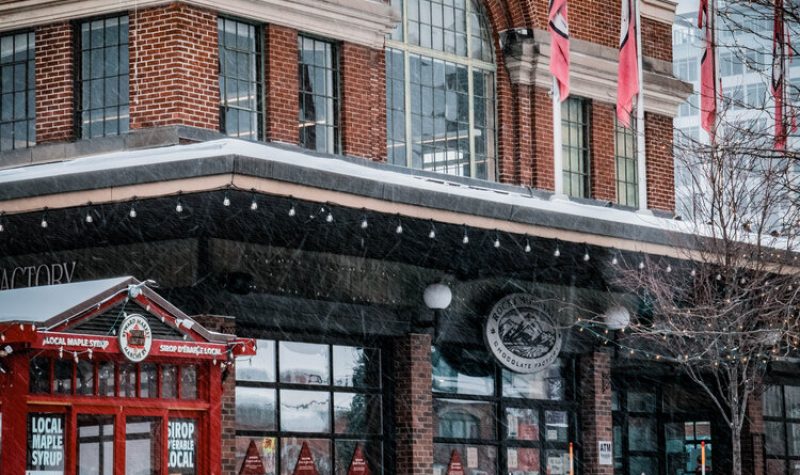Editor's Note: The author worked professionally with Ottawa Markets previously.
Following two years of the pandemic and the recent downtown occupation which forced most of the core to close, local businesses are receiving renewed funding to help revive the city’s once-flourishing marketplaces.
Last month, the city announced several new measures to help businesses affected by COVID-19 restrictions, and closures due to weeks of protests downtown get back on their feet.
Ottawa Markets is the non-profit organization behind the Byward and Parkdale markets, historic year-round marketplaces offering artisan crafts and fresh food, produce and plants from local small vendors. Zachary Dayler, executive director of Ottawa Markets, spoke to CHUO on Friday about the plan to revitalize the Byward Market and the over 600 businesses residing in the area.
“It's been such a hard two years for any business,” says Dayler. “And particularly for retail too, because… what's happened is new behaviours have emerged, new patterns of shopping have emerged. Somebody who might be less inclined to shop online two years ago is probably doing some component of shopping online now.”
Dayler says that towards the end of January, business owners in the area were starting to become more optimistic about the future. Restrictions were loosening, and COVID-19 anxieties waning. However, the nearly month-long occupation of the downtown core by thousands of protestors and heavy trucks, which caused many of the businesses to close for several weeks, put yet another pause on reopening.
“This is where the federal government is, and people protest here all the time,” says Dayler. “But Ottawa is also the biggest small town you'll ever live in. So when that happened, I think because there was a sense of excitement for reopening, it just really took the wind out of everybody’s sails.”
According to Dayler, business-owners and employees in the Byward Market shared their discomfort with him regarding the presence of the convoy, citing safety concerns after being shouted at or harassed by participants.
Because of the shared uneasiness among people working in the area, Ottawa Markets opted to allow businesses to close at their own discretion pending the convoy’s departure.
According to Statistics Canada, 31 per cent of small businesses, which make up 98 per cent of Canada’s "employer businesses," saw at least a 30 per cent decline in revenue in 2020 compared to 2019. Additionally, 41.8 per cent of businesses said they expected to see a further decline in the first quarter of 2021.
A survey from the Ottawa Coalition of Business Improvement Areas (OCOBO) indicates that almost half of businesses surveyed closed for the duration of the occupation, with 76.2 per cent reporting a loss of revenue, and and 55.3 per cent saying they can’t make up for the lost money.
Dayler says the presence of the convoy was intimidating not only for business-owners and employees, but for residents who had previously been showing support for local businesses throughout the pandemic.
“You have all the road closures, you have all the police—it's not a comforting or welcoming environment for the locals or even the visitors,” says Dayler. “Business in the area was probably the slowest I had seen it throughout any point in the pandemic.”
Municipal measures to mitigate the effects of the occupation include deferring property taxes for affected businesses and a total of 450-thousand dollars distributed through local Business Improvement Areas (BIAs). In addition to municipal funding, the provincial government announced more support for Ottawa’s downtown businesses on Friday. A total of $11.5-million will be invested in the local economy, with $10 million and $1.5-million being distributed through Invest Ottawa and Ottawa Tourism respectively. Businesses can apply for grants of up to $5,000 to help pay for costs incurred during the occupation.
Dayler says that although the money will help, businesses traumatized by the occupation are still worried it won’t go far enough.
“There's obviously optimism, but to be clear, there's a lot of concern,” says Dayler. “Things like the financial support from the federal government—you'll hear from businesses that that's not enough for what just happened. But I think the hope is that with those collective supports, we can make it a bit easier for businesses to claw back. But we have no illusions, it's going to be a challenge.”
On top of the targeted funding for independent businesses, Dayler says Ottawa Markets has also secured $25,000 in funding from the city, which will be used for the revitalization of vending programs, including the expansion of the seasonal Night Market.
“The plan is to make sure that the Night Market can happen over the entire season,” says Dayler. “What we're looking to do is to invest in that type of programming that's going to help educate the behaviours that I mentioned. We’ve really got to work hard at educating people on the importance of coming out to a market… and seeing your city space at least once a week, once every couple of weeks.”
Dayler, who anticipates a long road to recovery ahead, says the most important thing residents can do to show their support for small businesses is to explore the city’s public marketplaces, buy local, and encourage others to do the same.
Listen to the CHUO story below:


